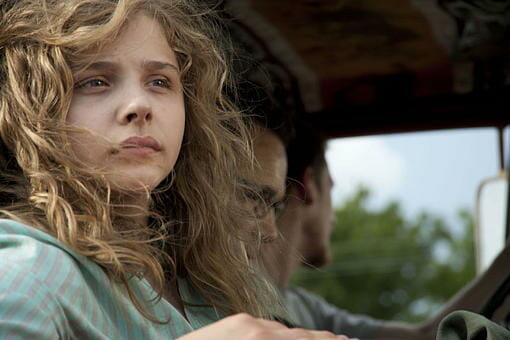By Jim Rohner · October 17, 2011

Being unemployed, I'm frequently instructed by well-meaning third parties to take any opportunity to network and meet as many new people as possible. The adage, as I'm sure we've all heard, says that in order to get ahead in life professionally, who you know is more important than what you know. Hollywood, being just as big a business as investment banking, is no exception. In fact, it may typify that wisdom more wholly than any other industry on this planet: Jason Reitman is standing on the directorial shoulders of his father, Ivan; Adam Sandler's ascension to hackneyed comedy Christ has also helped his Happy Madison buddies pay their bills; and even little Jaden and Willow Smith are getting jiggy by osmosis thanks to daddy Will's reputation.
Yes, indeed nepotism seemingly runs rampant in the streets of Hollywoodland and this weekend we were exposed to its most recent benefactor. Directed by Ami Canaan Mann, daughter of legendary director Michael Mann (Heat, The Insider), Texas Killing Field can officially thank dear old dad – who also scored a producer credit – for its release as the Mann association is only conclusion at which I can logically arrive to explain why such a forgettable film was even made in the first place.
Texas City, Texas is by no means a major metropolitan area, but the local law enforcement is just as dedicated as any big city cops. Investigating the murder of an unknown teenage girl is Detective Brian Heigh (Jeffrey Dean Morgan), a transplanted New York City cop with a big heart, and his very own Bud White, Detective Mike Souder (Sam Worthington). While Heigh employs empathy, discussion and keeping a cool head, Souder opts for violence, threats of violence and regurgitating all the exposition and one-liners expected of the latter half of the good cop/bad cop equation.
Troubles arise when Heigh is contacted by Detective Pam Stall (Jessica Chastain) who's requesting help on her case – the disappearance of another young girl. Souder, coincidentally Stall's ex-husband, insists Heigh stay away from the case. For one thing, the girl disappeared outside of their jurisdiction. For another, the girl disappeared in "The Fields," a barren swampland known for being a corpse dumping ground.
Despite his partner's insistence, Heigh agrees to help. A family man and regular churchgoer, he can't turn his back on the gruesome case. Cracks eventually appear in Heigh's calm and collected demeanor as connections form between his and Stall's cases and as it appears that the killer has set his sights on Anne Sliger (Chloe Moretz), a troubled youth who looks to Heigh as a surrogate father.
Being the daughter of the man who has directed such great crime thrillers as Heat, Collateral, and Manhunter, it's rather surprising how far the apple has fallen from the tree. The problems undoubtedly begin with the script, written by first-time screenwriter/longtime DEA Agent, Donald Ferrarone. Obviously an expert on the procedures involved in detective work, Ferrarone is badly lacking in the areas of character and conflict. Rather than take the time to explore the inner machinations of the two detectives at the heart of the conflict, Heigh and Souder are written as walking cliches, saying and doing all the things that better movie detectives have said and done before but without any of the heart or gravity behind them. What we get instead are countless scenes of characters holding our hands and walking us through what's going on as though the law of "show, don't tell" was jettisoned very early in the writing process.
In the hands of better actors, the derivatives might've stood a chance at being watchable, but B-listers Jeffrey Dean Morgan and Sam Worthington, whom no one will mistake for De Niro and Pacino, aren't capable of elevating their performances above the material. Much of this blame might likely lay at the feet of Mann who directs the film as though she's just going through the motions. No one should expect such geese to lay golden eggs, but unforgivable is the fact that Mann's inexperience holds back the performances of Moretz and Stephen Graham, both of whom are criminally underused, and muddles the work of Oscar-nominated cinematographer Stuart Dryburgh.
Lacking any inspiration and adding nothing to its genre, Texas Killing Fields unbearably slogs along thanks to gaping plot holes and convoluted editing. The surprise of the killer's identity is not due to any clever or intelligent writing, but is instead an inadvertent consequence of a script that has no soul and a director unprepared to elevate her source material.